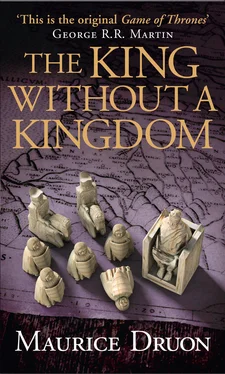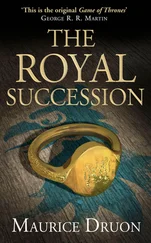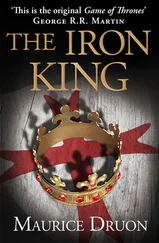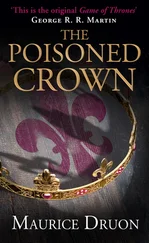This time, we have no such need to rush. First, even if we are enjoying a mild spell, days are short at this time of year. I don’t recall November in Périgord being so warm, as warm as it is today. What beautiful light we have! But we are in danger of running into a storm as we advance to the north of the kingdom. I plan on taking roughly one month, so that we’ll be in Metz by Christmas, God willing. No, I am not in nearly as much of a hurry as last summer; despite all my efforts, that war took place, and King John was taken prisoner.
How could such ill fortune befall us? Oh! You are not the only one to be flabbergasted, my nephew. All Europe felt not inconsiderable surprise and has since been arguing about the root causes and the reasons. The misfortunes of kings come from long ago, and often one takes for an accident of fate what is really the fatality of their very nature. And the bigger the misfortunes, the longer the roots.
This whole business, I know it all in great detail – pull that blanket over towards me a little would you? – and I might say I even expected it. I expected a great reversal of fortune, a humbling, would strike the king down, and thus, alas, bring down his kingdom with it. In Avignon, we in the Church need to know all that may interest the courts. Word of all the scheming, all the plotting, finds its way back up to us. Not a single marriage could be planned that we don’t know about before the betrothed themselves. ‘In the event of lady such-and-such accepting the hand of lord so-and-so, who is in fact her second cousin, would our Most Holy Father bestow upon us his permission to thus join their two crowns?’ Not a single treaty would be negotiated without our receiving visits from agents of both sides; not a single crime committed without the instigator coming to us in search of absolution. The Church provides kings and princes with their chancellors as well as most of their jurists.
For eighteen years now the houses of France and England have been in open conflict. But what is the cause of this war? King Edward’s claims to the French crown most certainly! That is indeed the pretext, a fine legal pretext is how I see it, as we could debate the issue ad infinitum; but it is neither the only, nor the true motive. There are age-old ill-defined borders between Guyenne and neighbouring counties, such as ours to begin with, Périgord, borders suggested by unintelligibly written land charters, where feudal rights overlap; it is difficult for vassal and suzerain to come to an understanding when they are both kings; there is trade rivalry, primarily for wool and cloth, which was the cause of the fight for Flanders; there is the support France has always offered the Scottish, who represent a threat to the English king to the north. War didn’t break out for one reason alone, but rather for the twenty that had been smouldering like embers and glowing in the night. When Robert of Artois was banished from the kingdom, with honour lost, he went to England to blow on the firebrands there. The pope at that time, Pierre Roger, that is Clement VI, did everything in his power to prevent this war, and pulled as many strings as he could to counter the malicious warmongers. He preached compromise, inviting concessions on both sides. He too dispatched a papal legate, who was by the way none other than the current pontiff, at the time Cardinal Aubert. He wanted to revive plans for a crusade in which the two kings were to participate, taking their noblemen along with them. It would have been a fine means of diverting their warring urges, with the added hope of reuniting Christendom. Instead of the crusade, we got Crécy. Your father was there; you had word from him of this disaster.
Ah! My nephew, you will see it throughout your life, there is no merit in serving a good king with all one’s heart; he leads you to do your duty, and the pains one takes don’t matter because one feels that they contribute to the greater good. What is difficult, however, is to serve a bad monarch well … or a poor pope. I saw how happy they were, those men at the time of my distant youth who served Philip the Fair. Being loyal to the vainglorious Valois requires far more effort. They are only prepared to heed advice or listen to reason when defeated and trounced.
It was not until after Crécy that Philip VI accepted a truce based on the proposals I had drawn up. Not so bad after all, or so it would seem, as the truce lasted roughly, despite a few local skirmishes, from 1347 to 1354. Seven years of peace. For many, potentially, a time of contentment. But there you are; in our accursed century, no sooner war is over than the plague takes hold.
You were spared in Périgord. Admittedly, my nephew, admittedly, you paid your tribute to the scourge; yes, indeed you have had your share of honour. But it is nothing beside the deaths that occurred in the numerous towns surrounded by populous countryside, like Florence, Avignon or Paris. Did you know that the disease came from China, via India, Tartary and Asia Minor? It spread, or so they say, as far as Arabia. It is indeed an illness for the unbeliever, sent to us to punish Europe for too many sins. From Constantinople and the shores of the Levant, ships transported the plague to the Greek archipelago, whence it gained the ports of Italy; it crossed the Alps and came to wreak havoc upon us, ahead of countries northward, moving on to England, Holland, Denmark and finishing up in the far north, Norway, Iceland. Have you had both forms of the plague here, the one that kills in three days, with burning fever and coughing up of blood … the unfortunate ones afflicted said they were already enduring the wrath of hell, and the other, with its more drawn-out agony, five or six days, with the same fever and great carbuncles and pustules appearing in the groin and armpits?
Seven long months we suffered this in Avignon. Retiring every evening we wondered if we would see the light of day. Every morning we would explore our underarms and crotches. To feel the faintest heat in those places was terrifying; people would be seized with dread and stare at you with mad eyes. With each breath we said to ourselves perhaps it will be with this mouthful of air that evil will enter. We never left the presence of a friend without thinking ‘will it be him, will it be me, or will it be both of us?’ Weavers were dying in their workshops, falling to the ground beneath their stilled looms, silversmiths dead beside their crucibles gone cold, moneychangers rotting under their counters. Children were dying on their dead mother’s pallet. And the smell, Archambaud, the stench in Avignon! The streets were lined with corpses.
Half, you hear me well, half the population perished. Between January and April of the year 1348 we counted sixty-two thousand dead. The cemetery that the pope bought in haste was full within just one month; we buried eleven thousand bodies there. People departed this life without servants, and were committed to the grave without priests. The son no longer dared visit his father, nor the father his son. Seven thousand houses closed up! All those who could, fled to their properties in the country.
Clement VI stayed in town along with several cardinals including myself. ‘If God wants us, He will take us.’ And although he compelled most of the four hundred officers of the papal household to stay on, they were scarcely enough to organize relief operations. The pope handed out wages to all the doctors and physicians; he hired carters and gravediggers, had supplies distributed and prescribed sound enforcement measures to limit contagion. Nobody at that time accused him of recklessly squandering resources. He reprimanded monks and nuns alike who shirked their charitable duties towards the sick and the dying. Ah! I heard a few things during confession: the repentance of the high and mighty, even those of the Church, who came to cleanse their souls of all their sins and seek absolution! Even the big Florentine and Lombard bankers, who confessed through chattering teeth and suddenly discovered their generous selves. And the cardinals’ mistresses … oh yes, oh yes, my nephew, not all, but a fair few cardinals … these beautiful ladies came to hang their jewels on the Holy Virgin’s statue! They held handkerchiefs under their noses, impregnated with aromatic essences, and threw away their shoes before entering their homes once more. Those who accused Avignon of impiety, of being the new Babylon, didn’t see it during the Great Plague. We were pious all right, I assure you!
Читать дальше












